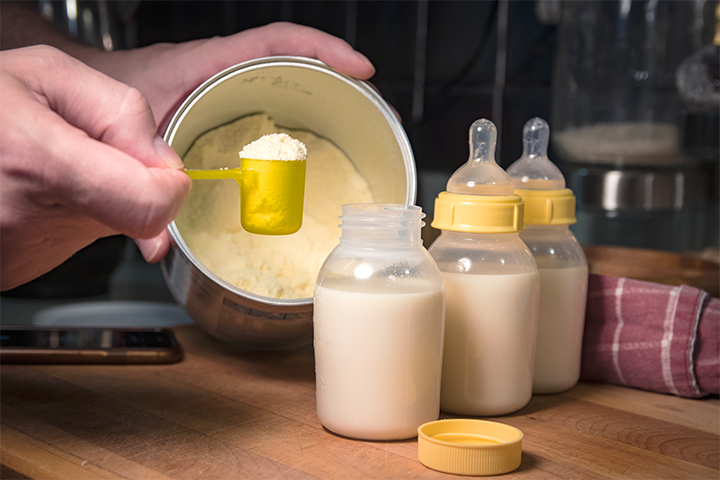Newborns only feed on breast milk or formula milk, but older babies may feed on cow’s milk or soy and almond milk (plant-based). While cow’s milk is the most common alternative to breast milk, some parents plan to use goat milk for babies.
Goat milk is considered a good replacement for breast milk and cow’s milk and provides several health benefits to the baby. However, before making a choice, you should consider its nutritional content and safety criteria. Also, you should consult a doctor before introducing the milk to your baby.
Read the post to understand the uses of goat milk, its health benefits and side effects, and things to consider before choosing it for your baby.
When Can Babies Have Goat Milk?
Babies can be given goat’s milk if they are one year old or more, although only after consulting with the pediatrician (1), although only after consulting with the pediatrician. Goat milk can be given even if the baby is still breastfeeding. In fact, Ayurveda considers goat milk to be close to breast milk, and can be considered as a replacement. Some studies also show that goat milk contains antibodies that can protect an infant from harmful pathogens.
What Are The Benefits Of Goat Milk To A Baby?
Goat milk provides the following nutritional benefits to an infant:
- Better bioavailability of iron: More than 50% of iron found in goat’s milk is more readily absorbed by the body, compared to 13% from cow’s milk. A baby gets more iron per milliliter of goat’s milk than from cow’s milk (2).
- Goat milk pH is closer to pH of breast milk:Goat milk is alkaline like breast milk, but cow’s milk is acidic. Some experts state that the goat milk’s ideal pH levels make it a better choice for infants, as it also decreases the chances of gastrointestinal infections (3).
- Improves the bone health of anemic infants: A study found that mineral loss in bones due to anemia was improved when the affected individual was given goat milk. Hence, goat milk may be good for infants who are anemic (4).
- Goat milk may have anti-inflammatory properties: Some studies have shown that goat milk has anti-inflammatory properties and helps nurture the “good” bacteria in the intestine. These features can be beneficial in strengthening immunity and treating inflammatory gastrointestinal diseases like colitisiXA condition characterized by inflammation of the large intestine.(5).
- Easily digestible: When compared to the protein from cow’s milk, goat milk protein is less dense. The fat found in goat’s milk is composed of short-chain fatty acidsiX Fatty acids produced in the colon during bacterial fermentation of food. that break easily, which means goat milk can be digested faster and better. It also contains enzymes, protein and some omega-3 and omega-6 fatty acids that can contribute to the baby’s nutritional requirement (3).
How To Choose Goat Milk For A Baby?
The goat milk you choose for babies must be:
- Pasteurized: Choose pasteurized milk, which has been heated and cooled to remove pathogens.
- Fortified:Select goat milk enriched with nutrients, especially vitamin D that is necessary for healthy development of bones and vitamin B9 (folate), which is almost non-existent in natural goat’s milk. Fortified products can help your baby attain his recommended dietary allowance (RDA) of all the vital nutrients.
Prefer packaged goat milk since it is more likely to be pasteurized and fortified than raw goat’s milk sold loose.
Can You Give Goat Milk Formula To A Baby?
Yes. You can give goat milk formula to babies who are old enough to consume natural goat milk. While it is likely that the formula will be fortified with micronutrients, it is good to check the label for details.
Jojo Teckina, a mother and blogger, could not produce enough breast milk for her baby when she resorted to low-heat pasteurized goat milk. Later, she fed the baby a homemade goat milk formula. She shares, “I talked to my son’s pediatrician and a dietician, and we came up with a recipe for fresh goat’s milk formula that they approved. So that’s what I did. I made my son a homemade formula for the first year of his life. The cost per bottle was much less than powder, even with specific vitamins, oils, and low-glycemic coconut or brown rice syrup added to the milk mixture for the proper carbohydrate-to-protein ratio. I would make a half-gallon at a time, and my little one was drinking up to forty-eight ounces of the stuff per day by the time he was six months old (i).”
How To Make Goat Milk Formula?
Goat milk formula is prepared in the same the usual formula is, by mixing warm water and formula powder. You can also refer to the manufacturer’s instructions on the goat milk formula can/packet to know the precise method.
Goat Milk vs. Cow Milk – Which Is Better?
Goat milk contains as many nutrients as cow’s milk does. However, cow milk has slightly more vitamin content compared to goat milk. Here is a table comparing the vital nutrient content in 100 g of goat milk and cow milk.
| Nutrient | Cow Milk | Goat Milk |
|---|---|---|
| Energy | 42kcal | 69kcal |
| Carbohydrates | 4.99g | 4.45g |
| Natural sugars | 5.2g | 4.45g |
| Protein | 3.37g | 3.56g |
| Fat | 0.97g | 4.14g |
| Calcium | 125mg | 134mg |
| Iron | 0.03mg | 0.05mg |
| Magnesium | 11mg | 14mg |
| Phosphorus | 95mg | 111mg |
| Potassium | 150mg | 204mg |
| Sodium | 44mg | 50mg |
| Zinc | 0.42mg | 0.3mg |
| Vitamin C | 0mg | 1.3mg |
| Vitamin B1 (Thiamin) | 0.02mg | 0.048mg |
| Vitamin B2 (Riboflavin) | 0.185mg | 0.138mg |
| Vitamin B3 (Niacin) | 0.093mg | 0.277mg |
| Vitamin B6 | 0.037mg | 0.046mg |
| Vitamin B9 (Folate) | 5µg | 1µg |
| Vitamin A | 14µg | 57µg |
Source: United States Department of Agriculture
According to experts, there is not much difference in the nutrient value of cow milk and goat milk. Goat milk can be ideal for infants who do not like the taste of cow milk. If you still prefer goat milk, select all-natural organic cow milk fortified with vital nutrients.
Are There Any Drawbacks Of Giving Goat Milk To An Infant?
The United States Department of Agriculture (USDA) does not recommend giving goat milk or formula to infants aged less than 12 months as it can cause severe nutrient deficiency and other health complications (6).
Babies older than 12 months seldom have any complications on consuming goat milk. However, experts suggest that goat milk should not be the sole source of nutrition for a toddler. It can be used along with other foods to ensure balanced nutrition (7).
Can A Baby Be Allergic To Goat Milk?
Yes. A baby can be allergic to goat milk (3). Symptoms of goat milk allergy include skin hives, abdominal cramps, nausea, vomiting, and diarrhea. The baby may also have a swollen face and drowsiness. Avoid goat milk if your baby already has other food allergies. If you see any signs of an allergic reaction, take your baby to a doctor right away.
Can You Give Goat Milk To A Baby Who Is Allergic To Cow Milk?
No. It is best to avoid goat milk if your baby has cow milk allergy or intolerance. Goat milk has more or less the same type of proteins found in cow’s milk. Therefore, babies who are lactose intolerant or allergic to cow’s milk are quite likely to be allergic to goat milk. Some may even display a severe allergic reaction to goat milk (8).
Also, there isn’t sufficient research suggesting that goat milk is safe for infants allergic to cow milk (9).
Can A Baby Have Goat Cheese And Yogurt?
Yes. Babies can have goat cheese and yogurt at 12 months old (10). Cheese and yogurt are good sources of probiotics that can promote a baby’s overall health. However, some goat cheeses are made from unpasteurized milk, which is not recommended for infants. So check the label before purchasing any dairy products for the baby (11).
Is Goat Milk Safe For Babies With Eczema?
Consult a pediatrician before introducing goat milk to a baby with eczemaiXDry and itchy rash on the skin due to specific allergenic foods or medicines.. If the eczema is due to a cow milk allergy, then avoid goat milk. About 90% infants with allergic dermatitis (eczema) due to milk allergy can be allergic to goat milk as well (12).
Can You Use Lactose-free Goat Milk Formula?
Yes. If your baby has lactose intolerance, then you can select a lactose-free goat milk formula. In any case, consult a pediatrician before altering the baby’s diet.
Is Goat Milk Good For Babies With Acid Reflux?
There is no evidence that goat milk can be beneficial to infants with acid reflux. Only breast milk is proven to lower the chances of reflux in infants (13).
Does Goat Milk Help Ease Constipation In Infants?
Research does not prove that goat milk eases constipation in babies. If you suspect that the baby is constipated because of cow milk consumption, switch to goat milk and see if his condition improves.
Is Goat Milk Good For Babies With Colic?
There is no proof to support it. Colic can occur due to gassiness caused by indigestion or an allergic reaction to cow or goat milk. Such infants may benefit from special hypoallergeniciXRelated to substances less likely to cause an allergic reaction.formulas containing hydrolyzed cow milk proteiniXMilk protein broken down in water for optimum enzymatic activity, making it easier to digest. instead of goat milk (14).
Some parents intend to provide goat milk for babies other than cow’s milk once they reach one year old. When consumed as part of a well-balanced diet, goat milk can offer babies better iron bioavailability than cow’s milk, improved bone health in anemic infants, several anti-inflammatory properties, and a variety of other advantages. However, it is recommended to avoid drinking raw goat milk because it can be detrimental to babies (15). Instead, fortified goat milk and formula choices should be considered. You may still consider consulting your pediatrician to see if goat milk is safe for your baby.
Key Pointers
- After consulting a pediatrician, babies can be given goat milk at one year of age or older.
- Goat milk provides various health benefits for babies such as improved iron bioavailability, similar pH to breast milk, better bone health for anemic infants, and easier digestion.
- Before giving goat milk to babies, it should be pasteurized and fortified with vitamins and minerals.
- Cow and goat milk have similar nutrient contents, although cow milk contains slightly more vitamins.
- Choosing between goat and cow milk for a baby depends on personal preference and the desired health benefits.















